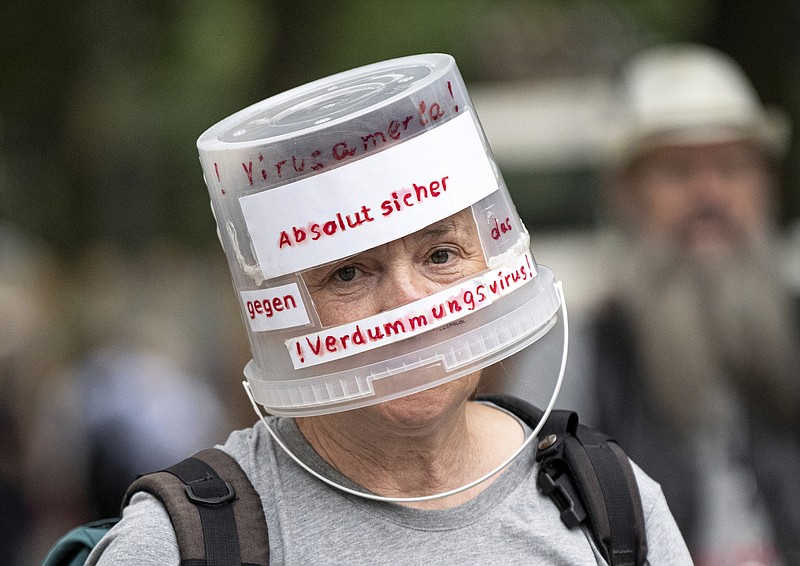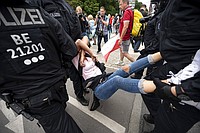BERLIN -- Thousands turned out in Berlin on Sunday to protest the German government's anti-coronavirus measures despite a ban on the gatherings, leading to clashes with police and the detention of some 600 protesters.
Local authorities banned several protests this weekend, including one from the Stuttgart-based Querdenker movement, but protesters in Berlin defied the ban.
Berlin's police department deployed more than 2,000 officers to try to disperse the protests, but it said officers who sought to redirect protesters or disband larger groups were "harassed and attacked."
[Video not showing up above? Click here to watch » arkansasonline.com/82berlin/]
"They tried to break through the police cordon and pull out our colleagues," Berlin police said, adding that officers had to use irritants and batons.
As the crowds made their way from Berlin's Charlottenburg neighborhood through Tiergarten park toward the Brandenburg Gate, police warned via loudspeaker that they would use water cannons if protesters did not disperse. By Sunday evening, police detained about 600 people, according to German media, and protesters were still marching through the city.
Germany eased many of its coronavirus restrictions in May, including reopening restaurants and bars. Still, many activities, such as dining indoors at restaurants or staying in a hotel, require proof that an individual is either fully vaccinated, has recovered from the virus or can show proof of a recent negative coronavirus test.
Although the number of new coronavirus cases in Germany remains low compared with neighboring countries, the delta variant has sparked an increase in new infections in the last few weeks. On Sunday, Germany reported 2,097 new cases, an increase of more than 500 over the previous Sunday.
The Querdenker movement, the most visible anti-lockdown movement in Germany, has drawn thousands to its demonstrations in Berlin, uniting a disparate mix on both the right and the left, including those opposing vaccinations, coronavirus deniers, conspiracy theorists and right-wing extremists.
Earlier this year, Germany's domestic intelligence service warned the movement was becoming increasingly radical and put some of its adherents under surveillance.
Wolfgang Schauble, president of Germany's parliament, sharply criticized the Querdenker movement Sunday, encouraging people not to be fooled by "cheap slogans."
"If practically all experts worldwide say the coronavirus is dangerous and vaccination helps, then who actually has the right to say, 'Actually, I'm smarter than that?'" he told the Neue Osnabrucker Zeitung. "To me, that is an almost unbearable level of arrogance."
The protests follow other demonstrations against coronavirus measures around Europe.
More than 200,000 people turned out Saturday in France to protest vaccination requirements for the third straight weekend, at times clashing with police. Some 80,000 others protested in cities across Italy last weekend.
[Gallery not loading above? Click here for more photos » arkansasonline.com/82covid19/]
Meanwhile in Britain, restaurants, ride-hailing apps and food delivery services are backing the country's covid-19 vaccination drive, offering discounts and even free slices of pizza to convince young people to roll up their sleeves and get the shot.
The program, announced Sunday by the Department of Health and Social Care, is designed to boost the vaccination rate among adults under 30 as Britain races to inoculate as many people as possible before colder weather arrives.
Although more than 90% of adults in Britain have received at least one dose of vaccine, the rate for people between the ages of 18 and 30 is about 60%, according to government statistics.
As he thanked businesses for helping out, Health Secretary Sajid Javid urged people to "take advantage of the discounts." Uber, Bolt, Deliveroo and Pizza Pilgrims are among the brands to offer incentives.
Britain is keen to increase vaccination rates amid a surge in new infections as the government seeks to fully re-open society. And politicians are anxious to bolster the economy as the national furlough program, which guaranteed the wages of millions of people who were unable to work due to government restrictions, comes to an end.
Treasury chief Rishi Sunak is urging Prime Minister Boris Johnson to ease international travel restrictions, arguing that Britain's "draconian" rules are unnecessary given the success of the vaccination program.
The Sunday Times reported that Sunak wrote to Johnson to encourage him to let people enjoy their summer holidays, while expressing concern about the impact the restrictions are having on tourism and the hospitality industry.
Johnson's Cabinet will meet later this week to review the current travel rules, which require expensive covid-19 testing for people arriving from most popular holiday destinations in Europe and force anyone coming from France to self-isolate for up to 10 days.
Information for this article was contributed by Emily Schultheis and Danica Kirka of The Associated Press.





